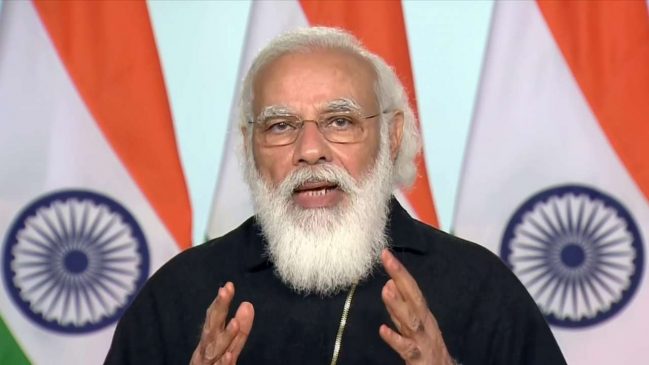The sector is known for its crucial role in manufacturing — for domestic as well as for global consumers — testing kits, masks, oxygen concentrators, PPE kits, syringes and ventilators
The Narendra Modi government has launched a Rs 500 crore initiative to strengthen India’s medical devices industry, aiming to make it a ‘game-changer’ in the country’s pursuit of ‘Atmanirbharta’ or ‘self-reliance’.
The medical devices industry has long been overshadowed by the pharmaceutical sector, often sharing policies planned for drug manufacturing despite being a completely different segment. However, the latest move shows that it has started to gain recognition, particularly after demonstrating its critical importance during the Covid-19 pandemic. The sector is known for its crucial role in manufacturing — for domestic as well as for global consumers — testing kits, masks, oxygen concentrators, PPE kits, syringes and ventilators.
Read More: RBI imposes penalty on South Indian Bank
According to the press release issued by the Centre, “medical device industry is an essential pillar of healthcare delivery”. The release recognises that from diagnostic machines to surgical instruments, and from stents to prosthetics, medical devices are critical for the prevention, diagnosis, and treatment of diseases.
In fact, it predicts that “India’s medical device market is valued at approximately $14 billion and is expected to grow to $30 billion by 2030″.
The comprehensive scheme launched on Friday targets critical areas of the medical device industry covering manufacturing of key components and accessories, skill development, support for clinical studies, development of common infrastructure and industry promotion.
“The scheme is going to be a game changer and it will not only help the industry but will also be a long leap in making India self-reliant,” JP Nadda, Union health minister, said in the release.
How will the scheme function?
The scheme for ‘Strengthening of Medical Devices Industry’ is typically five-in-one with an initial outlay of Rs 500 crore for three years — up to the financial year 2026-27.
The first sub-scheme for medical device clusters aims to plug the challenge of lack of infrastructure. The government will provide financial assistance to medical device clusters for creating common infrastructure facilities such as R&D labs, design and testing centre, and animal labs for the manufacturers located in the cluster.
The second sub-scheme provides marginal investment support to deepen the MedTech supply chain by focusing on manufacturing of key components, raw materials, and accessories within the country. “Currently, most raw materials and key components are imported, making Indian manufacturers reliant on external supplies for medical device production. This sub-scheme offers a one-time capital subsidy of 10-20 per cent, with a maximum cap of Rs 10 crore per project,” explained the press note.
The third sub-scheme focuses on capacity building and skill development for the medical device sector with a goal to develop a skilled technical workforce capable of designing and developing MedTech products. The Centre will offer financial support for running various masters’ and short-term courses.
The fourth sub-scheme is an initiative designed to assist both established companies and start-ups in conducting clinical studies. The scheme enables medical device developers and manufacturers to apply for financial support for animal studies and, if successful, then for human trials to validate MedTech products.
The fifth sub-scheme aims to support industry associations and exports councils by providing financial assistance to organise conferences and other events that promote medical device-related activities.
Read More: Delhi AQI Improves Slightly, Several Areas Still Breathe ‘Severe’ Air On Weekend
Experts welcome move
According to Rajiv Nath, forum coordinator, Association of Indian Manufacturers of Medical Devices (AiMeD), the budgetary allocation may seem small and humble but the “ground-breaking” strategy will have a multiplier impact as “it’s a clever leverage to move the Indian elephant in the direction to achieve the prime minister’s vision to make India the leading hub of medical devices manufacturing globally as announced in the National Medical Devices Policy 2023″.
Other experts echoed similar thoughts.
“Till the outbreak of Covid-19, medical device sector was considered a dwarf cousin of pharmaceutical industry. But during the pandemic, we played a crucial and critical role,” Rajiv Chhibber, vice-president, Sahajanand Medical Technologies (SMT), told News18.
SMT is India’s leading company for manufacturing stents with a market share of more than 30 per cent. Chhibber believes that all schemes will bring positive changes in the industry. “For instance: the fourth scheme will encourage various Indian manufacturers to go for global validations such as CE or US FDA approval. Right now, the process to apply for validations is expensive but when backed by the government, many small and medium-scale companies would be able to showcase and sell their products on foreign land.”
Sunil Khurana, CEO of BPL Medical Technologies, believes the government has adopted a pragmatic approach. He feels that all the announced sub-schemes are crucial and reflect a genuine effort by the Union government.
“While all announced schemes are well thought of, I would suggest that the government could also enter into partnership with friendly nations such as Japan for technology transfers.”
“As a part of the electronic medical devices industry, I believe that arrangements involving tech transfers (even on a royalty basis) can significantly reduce R&D time, potentially cutting it down from at least four years. I don’t want India to become another China, known for copycat products. Instead, we aim to learn and improve on existing technologies,” said Khurana from BPL Medical Technologies, which was the only company to have the technology to manufacture oxygen concentrators during the outbreak of Covid-19.





































